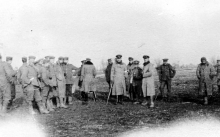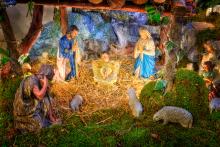Christmas

It’s beginning to look a lot like Christmas here. But Hanukkah? Not so much.
In this town of about 90,000 residents, including a large Jewish enclave, a complaint over a menorah set up beside a decorated Christmas tree in Town Square has triggered the menorah’s removal and upset numerous residents and at least one downtown merchant, who says township officials acted rashly.
For decades, Lakewood’s display has featured a Christmas tree and a small menorah. No one has complained until now, township officials say.

I was 6 years old, growing up in Cleveland. It was Christmas Eve. The traditional Slovak dinner was ready on the stove — mushroom soup and pierogies. My mom, my younger brother, and I were waiting for my dad to get home so we could eat.
The waiting part was no surprise.
My dad was an alcoholic. During the Korean War, he enlisted and was assigned to a paratrooper unit. He was wounded during a mission. My mom said the experience changed him. He brought some demons home with him.
“We can’t just blame it on the brokenness of the world, pray for peace, and move on, worried that anything more will be seen as politicizing tragedy. What is tragic is that those who have the ability to DO something about this crisis refuse to offer more than simplistic sentiments on Twitter before getting caught in a circular argument about our rights as Americans. It’s time for people of faith to respond.”
2. The 20-Year-Old Ban That Silenced Research on Gun Violence
Because: NRA. “Researchers from federal agencies including the Centers for Disease Control and Prevention (CDC) and the National Institute of Health (NIH) have largely been mum on the public health issue of gun violence — not by choice, but because of a 20-year-old congressional ban on federally funded gun violence research.”
3. Emanuel: Chicago City Officials to Release Ronald Johnson Shooting Video
Chicago Mayor Rahm Emanuel said Thursday that the city would release dashcam footage of a Chicago police officer shooting 25-year-old Ronald Johnson III in the back. The shooting happened eight days before officer Jason Van Dyke shot and killed 17-year-old Laquan McDonald.
4. People Think ‘The Wiz Live’ Is Racist. Twitter Says, ‘Huh?’
Actual tweet: "I just learned there is a Black version of 'The Wizard of Oz' called 'The Wiz.' How is this not racist?" Oy.

As in Biblical times, the Christmas season officially begins the day after Halloween, and that’s when the holiday catalogs started showing up.
Gird your loins folks: the Season of Audi has arrived.
The deep introspection, the "Emmanuel, God with us" soul-searching can wait until January, when all the hubbub has passed and the bills start arriving.
We piled the catalogs up on the dining room buffet as a visual warning against the coming materialistic storm. A few caught my eye:
“Soft Surroundings: My time. My place. My self. Winter collection. Clothing, home, beauty.” My, oh my, it really IS all about me. For the narcissist in all of us…
“HearthSong: Toys You’ll Feel Good About Giving. Over 100 New Toys… And Limitless Joy!” After 45 minutes of page-flipping, and several phone calls to their 1-800 line, it turns out that HearthSong does not sell Limitless Joy as a stand-alone product. It comes only with the purchase of a toy.

The Palestinian Authority has asked municipalities to tone down their public Christmas celebrations this year amid escalating violence between Palestinians and Israelis.
Hana Amireh, who heads a government committee on churches in the West Bank, confirmed the Palestinian Authority is requesting “a certain decrease” in festivities following the deaths of dozens of Palestinians since mid-September. The majority of them were killed during clashes with Israeli forces or carrying out terrorist attacks, according to the Israeli government.
Amireh said the government has asked the municipality of Bethlehem, the town where Jesus was born and where official Palestinian celebrations of Christmas take place, not to set off holiday fireworks this year and to limit the festive lights and decorations that traditionally adorn the town to two main streets.

ONE OF THE BEDROCK assertions of the Christian faith is that the kingdom of God is coming.
Jesus announced God’s reign, and embodied it, and brought it among us, but it is not here yet in full. The world’s brokenness and our own selfishness are testament enough that the kingdom is not here in full. But it is coming. And there’s not a thing we can do to hurry it, or stop it, or even delay it. We can, however, join in with it. That’s the best recipe for how to be a human being.
Advent’s reliable annual return is like the kingdom in its future certainty. The blue or purple paraments, the hymns in minor key, the candlelight, the longer nights—they all return, annually, like an old friend. Advent is a season of longing. The church places herself in the position of Israel, crying out for a savior. The hymns express this longing (“O Come Emmanuel, and ransom captive Israel, that mourns in lowly exile here”). Some churches have a “longest night” service on or around Dec. 21 for those who have experienced especially acute grief in the past year. Advent reminds us that life is not all cheerfulness, as if we needed reminding. It’s also sorrow, longing, waiting, and hoping.
Then Advent returns, ready or not. Just like Jesus and the reign he’ll soon bring in full. It’ll be here before you know it. And it’ll amplify the best parts of human life. It will shear off the worst parts. And it will make the world the one God dreams about.



Christmas is a time for celebration, joy, and family. But Christmas is much more than a sentimental holiday.
Christmas is subversive.
The Bible doesn’t tell us the specific date Jesus was born. Later Christians tradition gave us the date of December 25. It was chosen by Pope Julius around the year 350 and Christians have been celebrating Christ’s birth on that day ever since.
But Pope Julius didn’t just randomly pick December 25. He was deliberate. As Marcus Borg and John Dominic Crossan claim in their book The First Christmas, when Pope Julius declared December 25 as the date to celebrate Christ’s birth, he integrated “it with a Roman solstice festival celebrating the ‘Birthday of the Unconquered Sun.’ The Roman birthday of the sun became the Christian birthday of the Son.”
That last sentence isn’t just a cute turn of phrase. It symbolizes the subversive quality of Christmas.

Hope is not a feeling. It is a decision — a choice you make based on what we call faith or moral conscience, whatever most deeply motivates you.
I have said that for many years, but this Advent and Christmas season tests my words — even in my own heart.
This is not a time that many of us are feeling a great deal of hope. I hear that from many friends and allies as well.
In fact, many events this year feel like they have sucked the hope right out of us.
And yet, even in the midst of terrible events and stories, the possibilities of hope still exist depending on what we decide to do for reasons of faith and conscience. In fact, people of faith and conscience are already making a difference in the most difficult situations and places.
And that gives me hope. This season of Advent, in the Christian tradition, is a call to patient waiting.
Christmas is the celebration of God literally coming into the world in order to change it.

The letter arrived at work about two weeks after baseball’s opening day in 2003. It had a Zanesville, Ohio, postmark. A return address sticker mentioned a Mrs. Howard Richardson.
What‘s this about?
Inside was a handwritten note along with a neatly clipped copy of my Cincinnati Reds season preview story from the Zanesville Times Recorder. I didn’t have to read far to get the gist.
This Mrs. Howard Richardson — she wasn’t happy with me. Not at all.
In beautiful cursive — the kind of handwriting you don’t see anymore — she pointedly took me to task for suggesting the Reds could be awful that season. I should be more positive, she insisted. It would help the players.
“You get more flies with honey than vinegar!!!!!” she wrote. (Yes, underlined and topped off with many exclamation points.)
The note was signed: Evelyn Richardson.

Have you ever been enamored by a child’s sense of wonder? Their incredulous awe in myths like the tooth fairy and Santa, their wide-eyed anticipation of unwrapping a present?
We are most inspired by the unknown.
A magic trick — how did they do it?!
A movie with surprising plot twists.
A news scandal shrouded with mystery.
We are drawn to the unknown because it tickles the innate sense of curiosity within us to discover and explore. Mystery invites participation, not for the sake of removing what is unknown, but to ignite a passion for learning beyond what is certain and be changed through the process.
Why is it then, we insist on equating our Christian faith to certainty? We sing about a Blessed Assurance and hold intensive meetings to discuss the essentials of faith. We share testimonies of God stories to shelve any doubts of God’s existence. We preach the same sermons, pray the same prayers, tell the same stories, week after week to convince ourselves it all is still true.
Is this what our Christianity has been reduced to, more of the same? I am sorry, but I simply cannot muster up anymore enthusiasm for such a formulaic faith; it’s like taking elementary classes all over again. I already know that two plus two equals four.
I am longing for the gift of uncertainty, a type of profound mystery that welcomes questions, a faith that requires a leap of faith to sustain.

One hundred years ago, during the First World War, the Christmas truce took place between British, German, and French soldiers in the trenches on the Western Front. On Christmas Eve 1914, soldiers from opposing sides, who were stationed there to kill each other, instead got to know one another, shared photos of loved ones, and even had a game of soccer.
This of course made their superiors furious, not just because the troops were disobeying orders, but because it is much harder to harm someone with whom you have formed some sort of relationship. The enemy is to be faceless and nameless.
The same holds true for millions of people living in poverty around the world this Christmas. They are the faceless and nameless ones. In reality though, the enemy that is poverty is not faceless. Poverty is about people; it is not about statistics. Poverty is also not just about a lack of material goods; it is more about a lack of dignity, a lack of a sense that you are important. We are reminded that poverty is always personal because it is about relationship.

Author's Note: As we close out Advent, when we so quickly determine what’s our legal right or what we’re owed or what “the Bible really says” when, after all, we’re just simply too quick to judge. In these days where we must affirm #BlackLivesMatter, where we must stand up for victims of rape and abuse, and where we must struggle with our LGBTQ sisters and brothers for full inclusion, sermons like this are humbly offered.
We know the Christmas story well.
Those of us that have grown up with regular, annual, church-going rhythms — we essentially hear this story once a year.
Even so, those with no regular church commitments — people from all walks of life, people of faith or no particular faith, people from varied faiths — if you asked your friend, your neighbor, your cousin, a stranger on the street, I bet at least 50 percent of the time they’d be able to share the gist of the story:
Jesus was born to a virgin named Mary.
Mary was married to a guy (named Joseph).
There were angels, and wise men, and shepherds.
And I think there was a manger.
We know this story well.
But we hear it so often it becomes rote — literally a mechanically, automatically, mindlessly routine on repetition in our brains.
Yeah, yeah, yeah — 6lb 8oz baby Jesus, in a manger, Virgin Mary, Adopted Dad Joseph, sheep, shepherds, angels, stars at night, wise men, white Christmas, Rudolph the Red Nosed Reindeer …
You get my point.
So, let’s hear the story one more time and lean in a bit to this wild world of dreams, angels, and ancient Jewish marriage contracts.

I had just started as pastor of a large church when a key leader took me aside and said I was free to preach about anything I wanted, except homosexuality.
He didn’t want to hear any sermons addressing the issue then dominating many conversations among Christians. Keep the topic in the closet.
Sixteen years before, in a town once governed by the Klan, a leader told me not to preach about race. Too many people remembered signs saying, “Negroes must be out of town by sundown.”
Many clergy have been told, in terms ranging from kindly counsel to peremptory demand, to “keep politics out of the pulpit.”
Many a mainline pastor will attest: The one topic that Jesus addressed more than any other — wealth and power — was declared off-limits in congregations that hoped to attract wealthy constituents and their budget-saving pledges.
Many churches gave up their ethical voice in exchange for money, the very trade Jesus warned us against. The issue wasn’t partisan campaigning or endorsing specific candidates — a clear violation — but any mention at all of race, sexuality, warfare or economic injustice.
As a reader recently wrote me: “I hear enough about blacks on TV.”
So it is that Christmas becomes a sweet story and a centerpiece for family love.

The government of Sierra Leone banned public Christmas and New Year’s celebrations because they may exacerbate efforts to eradicate the Ebola virus.
President Ernest Bai Koroma said that despite immense help from the international community, the number of people infected with the virus continues to rise.
Ebola infections in Sierra Leone recently surpassed those of Liberia and Guinea.
“The illness started at the border and now is in the cities and close to 2,000 people have died from the outbreak,” Koroma told reporters. He asked traditional leaders and tribal chiefs to quit performing rituals in hopes that will help curb Ebola.
The majority of Sierra Leone’s 6 million people are Muslim, but Christmas is widely celebrated among the 27 percent of people who are Christian.
Officials said soldiers will be deployed on the streets and people are advised to stay at home with their families.

Figures in nativity scenes are pretty weird, aren't they? This is true of most manger scenes, whether we’re talking about the ceramic one under a tree or the statuesque one in a church or the plastic one on a lawn. First off, there’s Mary, always looking very fresh and calm and full of reflection — which is quite impressive considering that she just gave birth without any sedative. Then there’s Joseph, doing some kind of man-thing off to the side — holding a lantern or a large stick. He looks totally composed, too.
And there’s the baby Jesus with a full head of hair, wide-open eyes and arms outstretched like he’s ready to belt out a song.
Not to ruin anyone’s Christmas spirit here, but what the heck?
If our manger scenes were realistic, Mary would be recovering from a painful labor full of sweat and blood, with a look on her face that’s anything but serene. And Joseph — wouldn’t he be a nervous wreck, too? His hand too shaky to hold a lantern?
And about that newborn. Shouldn’t he be red-faced and screaming? Eyes clenched closed and wisps of hair stuck to the top of a head that‘s still odd-shaped from all the squeezing?
Instead, we’ve sanitized and romanticized it. We’ve removed all the blood and sweat and tears and pain and goo. It’s no longer something real. We’ve left out all the messy parts. The oh-my-God-what-now parts. The I’m-screaming-as-loud-as-I-can-because-it-really-hurts parts. The oh-no-I’ve-stepped-in-the-animal-droppings parts.
The real parts.

IF WE FOLLOWED the church calendar and celebrated Epiphany in January, we wouldn’t have to cram the wise men into the crèche to compete with the shepherds. We could save all the “Star of Bethlehem” songs to brighten the cold days of January. Obviously, the magi needed a few weeks to prepare and then travel “from the East.”
A new bright object in the sky was certainly an “epiphany,” but it was not totally unexpected. These magi were astrologers, the ancient astronomers of their day. To the east of Jerusalem lay Babylon, birthplace of astrology and location of a large Jewish community. The discovery of two astrological books among the Dead Sea scrolls showed that the sign of Aries the Ram in the zodiac represented the reign of Herod the Great in Judea. Since Herod was aging, it is not surprising that Jewish astrologers were watching this royal constellation.
In a television series called Jesus: The Complete Story, astronomer Michael R. Molnar notes an unusual astrological conjunction on the night of April 17, in 6 B.C.E., the year Jesus was most likely born. At that time, both Saturn and the sun were in the constellation Aries, and then the moon eclipsed to reveal Jupiter, king of the planets, also in Aries. Jupiter shone into the dawn, another auspicious sign of royalty. It was confirmation enough to send these astrologers on their way.
Perhaps if we celebrated Epiphany after Christmas, we’d have more time to learn about this epiphany and its remarkable interpretation.

Don’t check your watch. This is something else all together. We know it will soon be the end of November and the end of Thanksgiving weekend. In the Christian calendar, it’s the beginning of Advent, the season leading up to Christmas. For many people, the time between Thanksgiving and Christmas is a tough time to get through. There are too many reminders of loss:
-the empty chair at the Thanksgiving table;
-the time when being alone turns to loneliness as everyone talks about family (some stores were closed on Thanksgiving to show support for families, but what if you are estranged from your family?)
-the bright red lettering over Macy’s front door proclaims “BELIEVE” — but believe what? The very word can remind you that you don’t believe anything anymore. What time is it in your life right now?
Can we be as honest as the Bible?

I’ve decided not to worry about the earlier-than-ever start to Christmas commerce this year.
Shortly after Halloween, with hardly a nod to Thanksgiving, stores and advertisers began going full-bore on the supposed “Christmas package,” namely, gift-giving, family fun, decorating, and entertaining.
It’s sad — this annual effort to derive profits from a facsimile of a 1950s Christmas — but other things are a lot sadder: an elusive economic recovery, continuing gun violence, racial violence, religious extremism, mounting rage, and intolerance at home and echoes of the Cold War in Europe.
Let commerce tread the line between gauche and tacky — merchants have salaries and suppliers to pay, after all. We have a troubled world to care about.
The path to that care doesn’t go by way of Wal-Mart or Budweiser. It is God’s path, and it goes by way of anticipation, promises, prophetic vision, a birth, a life, a death, and over all of it a sustaining grace that cares little for our seasonal receipts but cares intensely about our lives.
Maybe it’s good that commerce has declared its independence from religion and decorum. That clears the way for faith to have its parallel season — not in competition with commerce, but as the deeper reality that commerce can never attain, the deeper meaning we yearn for.